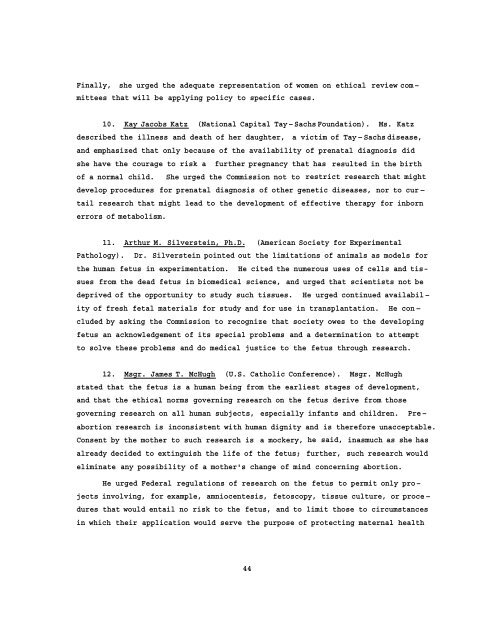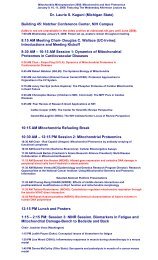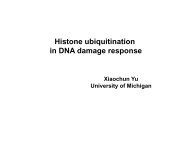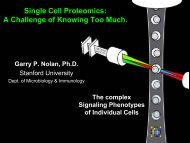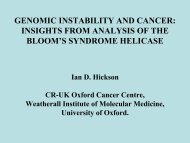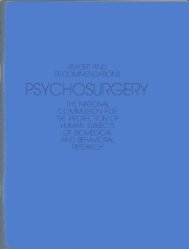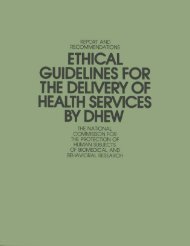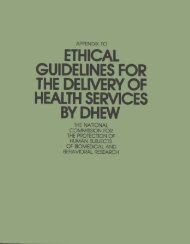RESEARCH ON THE FETUS - National Institutes of Health
RESEARCH ON THE FETUS - National Institutes of Health
RESEARCH ON THE FETUS - National Institutes of Health
Create successful ePaper yourself
Turn your PDF publications into a flip-book with our unique Google optimized e-Paper software.
Finally, she urged the adequate representation <strong>of</strong> women on ethical review com-<br />
mittees that will be applying policy to specific cases.<br />
10. Kay Jacobs Katz (<strong>National</strong> Capital Tay-Sachs Foundation). Ms. Katz<br />
described the illness and death <strong>of</strong> her daughter, a victim <strong>of</strong> Tay-Sachs disease,<br />
and emphasized that only because <strong>of</strong> the availability <strong>of</strong> prenatal diagnosis did<br />
she have the courage to risk a further pregnancy that has resulted in the birth<br />
<strong>of</strong> a normal child. She urged the Commission not to restrict research that might<br />
develop procedures for prenatal diagnosis <strong>of</strong> other genetic diseases, nor to curtail<br />
research that might lead to the development <strong>of</strong> effective therapy for inborn<br />
errors <strong>of</strong> metabolism.<br />
11. Arthur M. Silverstein, Ph.D. (American Society for Experimental<br />
Pathology). Dr. Silverstein pointed out the limitations <strong>of</strong> animals as models for<br />
the human fetus in experimentation. He cited the numerous uses <strong>of</strong> cells and tissues<br />
from the dead fetus in biomedical science, and urged that scientists not be<br />
deprived <strong>of</strong> the opportunity to study such tissues. He urged continued availability<br />
<strong>of</strong> fresh fetal materials for study and for use in transplantation. He concluded<br />
by asking the Commission to recognize that society owes to the developing<br />
fetus an acknowledgement <strong>of</strong> its special problems and a determination to attempt<br />
to solve these problems and do medical justice to the fetus through research.<br />
12. Msgr. James T. McHugh (U.S. Catholic Conference). Msgr. McHugh<br />
stated that the fetus is a human being from the earliest stages <strong>of</strong> development,<br />
and that the ethical norms governing research on the fetus derive from those<br />
governing research on all human subjects, especially infants and children. Preabortion<br />
research is inconsistent with human dignity and is therefore unacceptable.<br />
Consent by the mother to such research is a mockery, he said, inasmuch as she has<br />
already decided to extinguish the life <strong>of</strong> the fetus; further, such research would<br />
eliminate any possibility <strong>of</strong> a mother's change <strong>of</strong> mind concerning abortion.<br />
He urged Federal regulations <strong>of</strong> research on the fetus to permit only projects<br />
involving, for example, amniocentesis, fetoscopy, tissue culture, or procedures<br />
that would entail no risk to the fetus, and to limit those to circumstances<br />
in which their application would serve the purpose <strong>of</strong> protecting maternal health<br />
44


